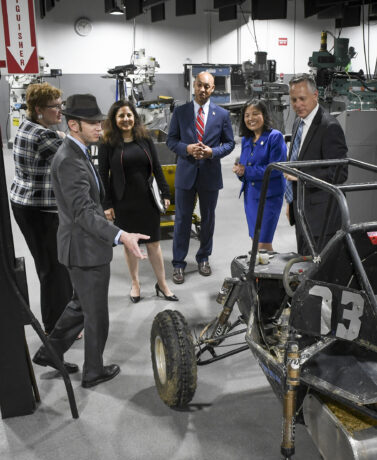RALPH WILSON/Sun-Gazette Correspondent Dean of Engineering Technologies Brad Webb, left leads a tour of the Larry A. Ward Technologies Center at Pennsylvania College of Technology on Thursday, July 11, 2024.
Pennsylvania College of Technology became the epicenter of a nationwide investment by the Biden administration in apprentice and pre-apprentice programs that provide students with the skills needed to match what today’s advanced manufacturing and high-tech workforce demands.
“Today’s historic investment in Registered Apprenticeships — the superhighways of our workforce infrastructure system — demonstrates the Biden-Harris administration’s commitment to both America’s workers and employers,” said Acting Secretary of Labor Julie Su during a visit Thursday morning to the college campus and announcement of a $4 million grant to be used by the college in its Registered Apprenticeship program.
The award, totalling more than $244 million nationwide, is expected to help to expand, strengthen and diversify programs that aren’t just “one-offs.”
“They create a pipeline of workers with in-demand skills, connecting them with good jobs that create real security for workers and their families,” Su said. “This interconnected system will help to ensure that all communities benefit from the jobs created by President Biden’s Investing-in-America agenda.”
The programs prepare workers for jobs in high-demand advanced manufacturing industries, including those in Greater Williamsport.
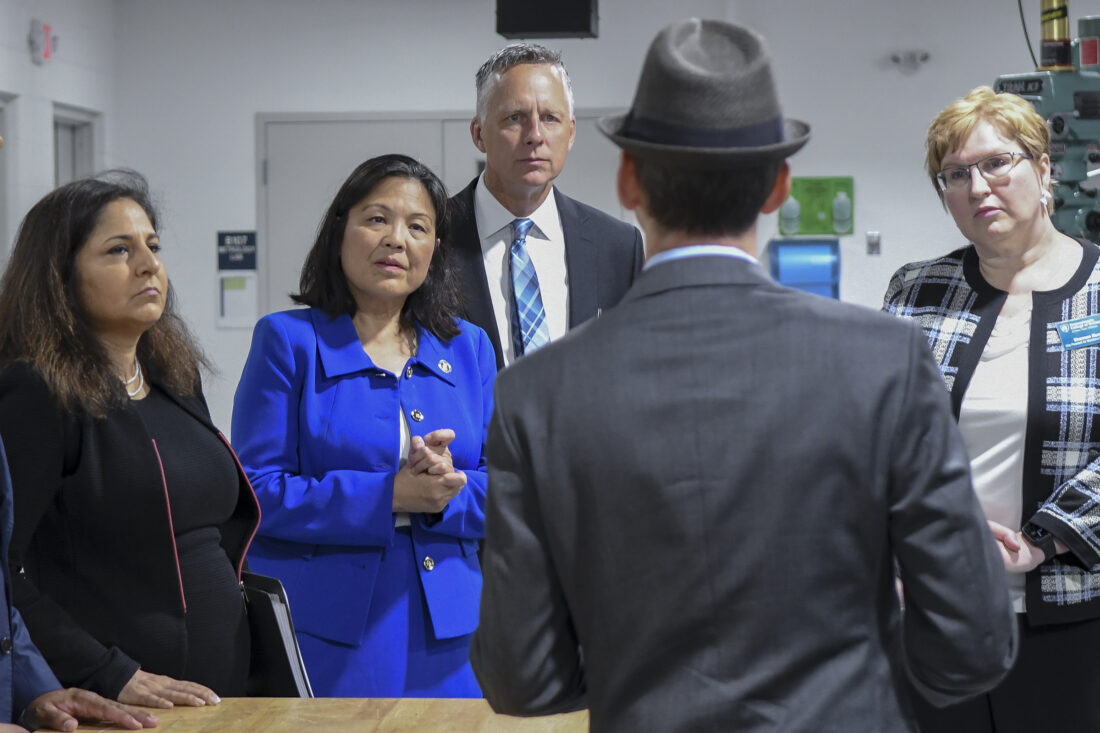
RALPH WILSON/Sun-Gazette Correspondent Dean of Engineering Technologies Brad Webb leads a tour of the Larry A. Ward Technologies Center at Pennsylvania College of Technology on Thursday, July 11, 2024. Shown from left are: White House Domestic Policy Advisor Neera Tanden, Acting Secretary of Labor Julie Su, Penn College President Dr. Michael J. Reed and Shannon Munro, Vice President for Workforce Development.
Registered Apprenticeships are in fields such as K-12 education, clean energy, information technology and cybersecurity, advanced manufacturing, supply chain, hospitality, care economy and public-sector occupations.
The specific grant funding will support what is known as the college’s Modular, Industry-Driven Apprenticeship Strategies (MIDAS) program, which enables Registered Apprenticeship programs to train job seekers with the skills they need for high-tech jobs, according to the college’s president, Dr. Michael Reed.
He noted the success rate for placement of Penn College students into the workforce is about 97% and that did not go unnoticed by Su or White House Domestic Policy Adviser Neera Tanden.
Su and Tanden said they believe the college’s apprenticeship program model is one to emulate across the nation.
“Interconnected opportunity infrastructure,” Sue said, was a means of shifting the students in the classroom into the workforce.
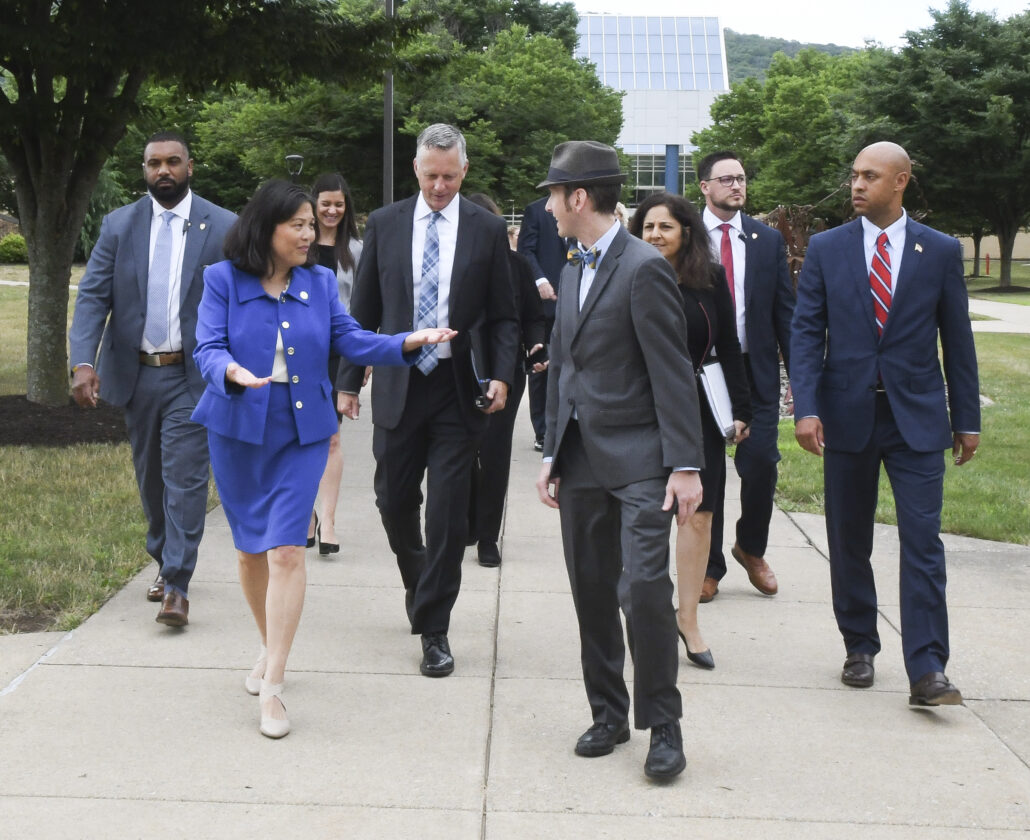
RALPH WILSON/Sun-Gazette Correspondent An entourage including federal dignitaries, college representatives and Williamsport’s Mayor tour a portion of the Pennsylvania College of Technology campus on Thursday, July 11, 2024. Acting Secretary of Labor, Julie Su, left announced over $244 million in federal grant money to be invested to expand the Registered Apprentice program during a press conference at the school. With Su are PCT President Dr. Michael J. Reed, President, Dean of Engineering Technologies Brad Webb, White House Domestic Policy Advisor Neera Tanden and Mayor Derrick Slaughter.
Using analogies to investments by the administration in the nation’s bridges, highways, water and sewer and energy services, Su said she considered this college and how it applies the apprenticeship model as an “on ramp,” with educational goals to match the needs of the existing workplace and create tomorrow’s workforce.
Su and Tanden noted how such apprenticeships are critical pathways toward the graduates experiencing fulfilling careers.
Even more, these are workers, often, who are able to find jobs in the immediate area, good-paying and family-sustaining wages and benefits, positions that enable those employed to take out a mortgage, invest in a home, pay rent, purchase cars, buy locally at stores and restaurants, and contribute to the taxbase and raise their families.
“The way I look at it is when students are sitting in a math class and learning about right angles, they might ask ‘why?’ but when you get into an apprenticeship it makes sense,” Su said.
That is why Su described the colleges like this one as “on-ramps,” a direct reference to the nation’s infrastructure, though not one of steel and concrete but rather bodies and brains.
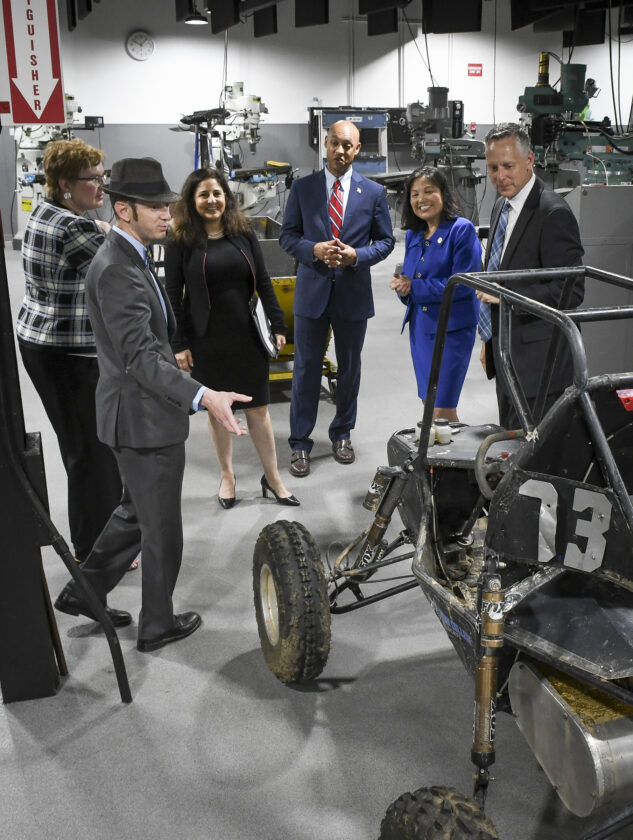
RALPH WILSON/Sun-Gazette Correspondent
Dean of Engineering Technologies Brad Webb leads a tour of the Larry A. Ward Technologies Center at Pennsylvania College of Technology on Thursday, July 11, 2024.
For too long, education has not been connected to actual jobs, the highway to prosperity has been broken or in need of a better model, according to Su.
She also remarked on what Reed said about the 97% rate of students finding employment after graduating.
“Students here are getting the skills that they need and so our investments are working and we are doing this across the country in our technological and community colleges,” Su added.
“We are here because it is a great model,” Tanden said. “This MIDAS (Modular, Industry-Driven, Apprenticeship Strategies) works to meet employer demand for advanced manufacturing occupations in Pennsylvania, New Jersey, New York and nationwide.
The program is a great model not just for Pennsylvania but for the whole country, Su and Tanden affirmed. “They’ve been doing this for a long time and they really understand the needs of businesses.”

RALPH WILSON/Sun-Gazette Correspondent Acting Secretary of Labor, Julie Su announces over $244 million in federal grant money to be invested to expand the Registered Apprentice program during a press conference at Pennsylvania College of Technology on Thursday, July 11, 2024.
Critical to this is the college’s business advisory group, which learns from local businesses what skills are needed and can adjust their learning models to that, Tanden said.
Su also observed the new developing clean energy house on a nearby campus lot and said that type of concept matches precisely what Biden’s priorities are — to build clean energy resources for the future of this country and having educational institutions such as PCT will respond to the investments that the president’s agenda is creating is very much what we see as a central piece of the administration’s strategy, she said.
She added how the federal government views what is happening at the college acting as a central hub between apprenticeships and the businesses that need those skilled workers as critical for the success of the nation.
“The model is a model for success for apprenticeships across the country,” Tanden said.
Williamsport Mayor Derek Slaughter said he was honored by their visit to the city.
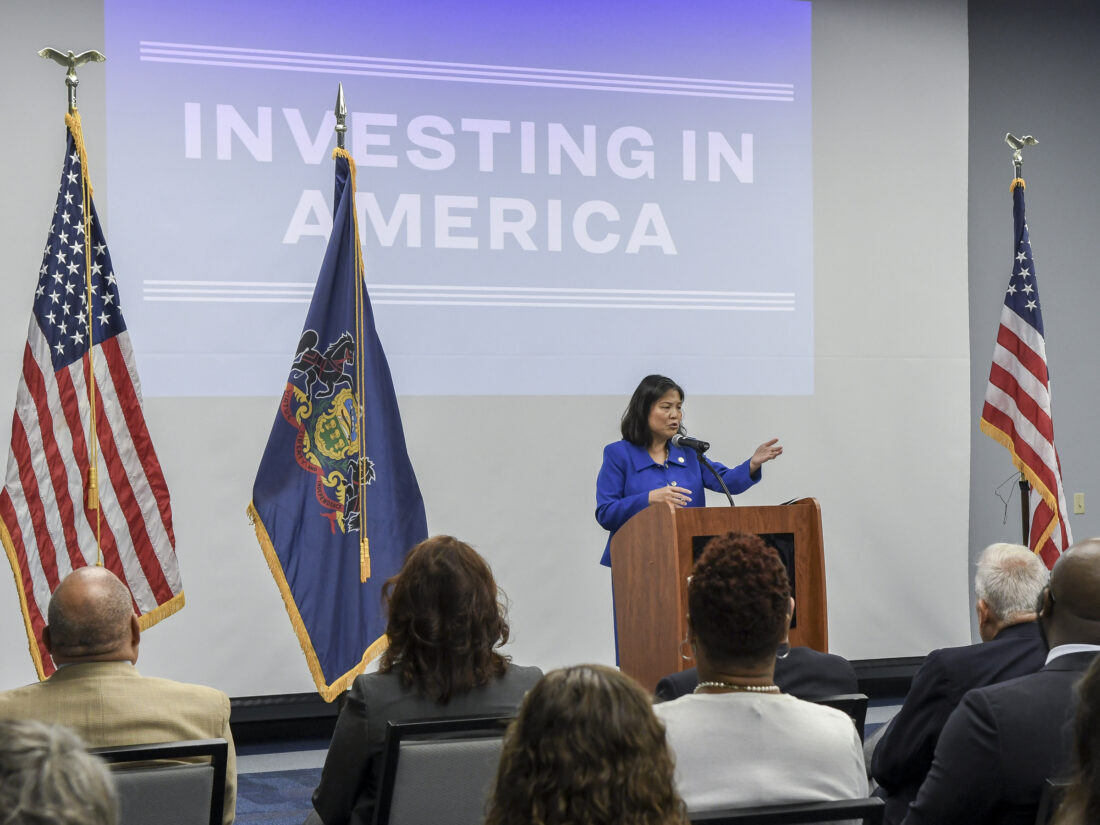
RALPH WILSON/Sun-Gazette Correspondent
Acting Secretary of Labor, Julie Su announces over $244 million in federal grant money to be invested to expand the Registered Apprentice program during a press conference at Pennsylvania College of Technology on Thursday, July 11, 2024.
Slaughter noted how the city rose to prominence as the lumber capital of the world during the 19th century.
Spurred by vast timber resources and a network of expansive saw mills, as time progressed, the city diversified its economic base.
Today, it boasts a robust labor force consisting of workers in advanced manufacturing, healthcare and biotechnology.
“This growth has been bolstered by its strategic location and skilled workforce,” Slaughter said.
The city has meshed its industrial heritage with that of modern technology and health care to sustain a vibrant economy.
“It is exceptional news for Williamsport to serve as the epicenter of this national announcement of the further developed pre-apprenticeship and apprenticeship programs, a proven method to place people on a pathway to prosperity,” Slaughter said.
He added: This critical investment in our community will allow Pennsylvania College of Technology to scale these programs and their delivery to Williamsport and communities across the U.S.
“The city is fortunate to have an institution such as Pennsylvania College of Technology located here,” the mayor said.
He recognized the college as a place to continue to empower “Our tomorrow makers for a future made by hand.”

